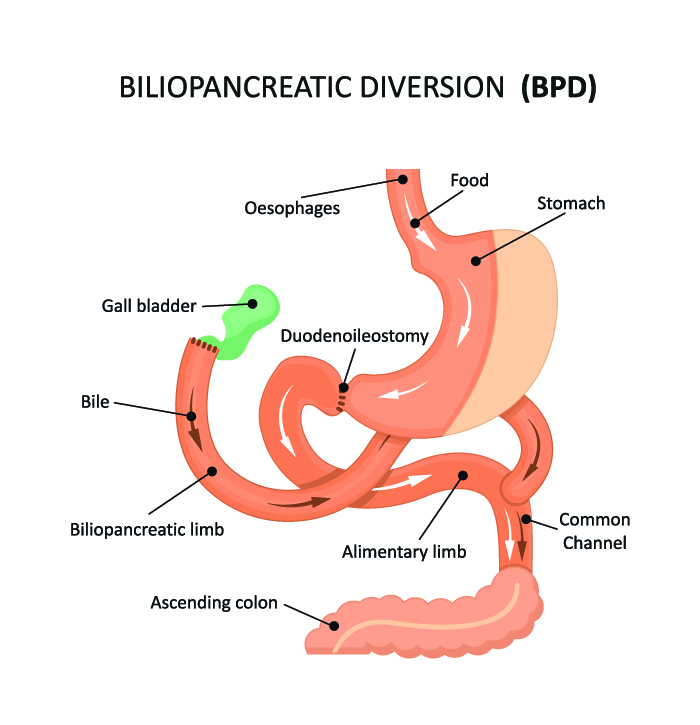Biliopancreatic Diversion Treatment in Koramangala, Bangalore
Biliopancreatic diversion is a complex weight-loss procedure that involves a set of surgical techniques that limit your food intake. It is not a very common procedure but is operated on obese people to help them reduce weight. To know more about biliopancreatic diversion surgery, search online for a bariatric surgeon near me.
What is biliopancreatic diversion?
Biliopancreatic diversion is a procedure that involves removal of 80% of the stomach with a complex procedure leaving behind a tube-shaped organ. The connections to the intestine are still left intact but the curvature of the stomach is reduced. Your stomach will be reduced in size and will allow only a little amount of food intake. This will make you full early and will eventually reduce your weight.

Why is biliopancreatic diversion surgery done?
It is done to reduce weight and prevent diseases like:
- Heart diseases
- Infertility
- Type 2 diabetes
- High blood pressure
- Severe sleep apnea
- High cholesterol
- Stroke
Who can undergo biliopancreatic diversion surgery?
- If you have failed to lose weight by following a strict diet and exercise, then you can undergo biliopancreatic diversion surgery.
- Patients who pass extensive screening tests and can endure complex procedures can undergo biliopancreatic diversion surgery.
- Patients who can commit to a strict lifestyle can undergo biliopancreatic diversion surgery.
When do you need to see a doctor?
If you fail to lose weight by conventional methods, consult a bariatric surgeon.
You can request an appointment at Apollo Spectra Hospitals, Koramangala, Bangalore.
Call 1860 500 2244 to book an appointment.
What are the risk factors of biliopancreatic surgery?
- Leaks in your gastrointestinal system
- Blood clots
- Adverse reaction to anesthesia
- Lung or breathing problems
- Infections
- Excessive bleeding
How do you prepare for biliopancreatic diversion surgery?
Your doctor will ask you to take screening tests to examine if you are fit to undergo the surgery. If you pass the test, he/she will ask you to take a few physical and blood tests. The doctor can also ask you to start a physical activity program before the surgery.
You should talk to the doctor about any medication you are on. If you are taking any blood-thinning medications, you should immediately inform your bariatric surgeon. You should also talk to a doctor about any chronic disease you are suffering from and any allergy that the doctor should be aware of. Before the surgery, the doctor can ask you to stop drinking, eating, or taking any medication. For more information, consult a bariatric surgeon near you.
How is biliopancreatic surgery done?
During the surgery, the doctor will operate on the abdomen to surgically remove 80% of the stomach through incisions. A banana-shaped tube is left behind after the surgery. After the surgery, you will be asked to be on a liquid diet because your stomach needs time to heal. Eventually, you will be shifted to a semi-solid diet and then after a few months, you can have a regular diet. Your doctor will prescribe some medicines like multivitamins, calcium, and Vitamin B12 to prevent micronutrient deficiency. You will have to visit your doctor frequently for regular checkups.
What are the risks of biliopancreatic surgery?
The procedure is one of the rarest methods to reduce weight but can lead to negative consequences like vitamin deficiencies and malnutrition. Also, watch out for:
- Vomiting
- Hernia
- Ulcers
- Stomach perforation
- Malnutrition
- Low blood sugar
- Gallstones
- Bowel obstruction
- Diarrhea, nausea
Conclusion
Biliopancreatic diversion is a rare and complex surgical procedure operated in patients with obesity. After the surgery, you have to follow a strict diet to heal quickly. There are no fatal consequences of the surgery, however, risks may include gallstones, ulcers, hypoglycemia, diarrhea, malnutrition, etc.
The following symptoms can be seen in patients after the surgery:
- Mood swings
- Hair thinning and losing
- Body aches
- Feeling tired or cold
- Dry skin
- If you have any such symptoms after the surgery, immediately
- inform your bariatric surgeon.
You will have to stop drinking and eating any food hours before the surgery. You will have to quit smoking and drinking alcohol and stop taking blood thinners before the surgery
The stay will depend on your recovery and you will be guided by doctors about the post-surgery recovery program. Consult a bariatric surgeon near you for more information.
Symptoms
Our Top Specialities
NOTICE BOARD
CONTACT US
CONTACT US
 Book Appointment
Book Appointment


.svg)
.svg)
.svg)
.svg)








